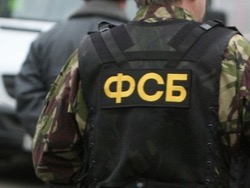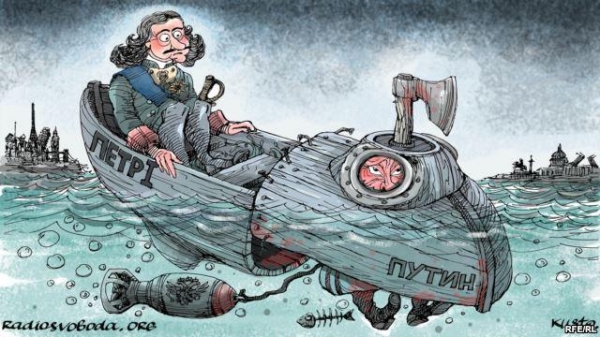
Recent dramatic events — the arrests of the heads of the Investigative Committee in Moscow and searches at the head of the Federal customs service has generated a lot of versions regarding conflicts within law enforcement agencies and arguments about almost impending coup.
In the circles of serious students of the Russian elite began to talk about “kakistocracy-2”, coming to replace the former elite groups, whose representatives knew Putin before he became President of the Russian Federation. It may well be that it is only the change of generations or against “certain groups” of the security forces for influence in the Kremlin, but it seems to me important to note a slightly different slice of the problem, to some extent even more worrisome.
Vladimir Putin has always relied on people from power structures, from which is he himself, is well known. However, during all of 2000-ies was easily noticeable two trends. On the one hand, a considerable part of the President’s closest friends (even if he knew to the KGB) were placed in key positions in the business sector: Gazprom, Rosoboronexport, VNESHECONOMBANK, “Rosneft” — just some of the examples. On the other hand, a considerable influence on the President has given those who, being also his longtime friends, directly went into business, albeit one that was closely associated with the Kremlin: here we may recall G. Timchenko, A. Rotenberg brothers, Kovalchuk, Vladimir Yakunin, N. Shamalov and many others. Both of these trends point to the fact that the country’s political system had to guarantee the possibility for the elite to do business and conditions for senior officials of the state to benefit from it. Panama offshore companies are extremely opaque “Surgutneftegas”, “Gazprom” with its “daughters” — it all fit in the well known scheme gssp capitalism, where all his Russian specifics the second word was more important than the first.
In other words, in 2000 years the security forces — no matter how influential they may seem — were the instruments of enrichment of the first persons who at the time I sincerely hoped that they will become part of the global financial elite and their wealth will be multiplied along with the success of the country. It is no coincidence that in 2008, Miller dreamed that the capitalization of “Gazprom “in the next 7-8 years”… will reach $1 trillion. No matter how forgotten the democratic principles, no matter how trampled freedom of the press, in whatever measure the court system nor was subordinated to the Executive power, the logic of the government’s actions was economic. That is why the most important assets of real resources: there was a struggle for new licenses for oil and gas production; the plots in the largest cities; for the right to receive the permission to organize free economic zones; for a monopoly or quasi-monopoly positions in trade; agricultural lands suitable for agricultural business regions; for the allocation of frequencies for mobile communications — in other words, the struggle for the opportunity to do business “under the wing” of the state. Yes, this business might not be quite “clean”, it could massively “fronting”, but it was still a business. Business ideology seized the Russian bureaucracy in the end, did its negotiability, even after the war in the Caucasus in 2008, relations with Europe have been normalized, “not having to deteriorate”. This approach required the active intervention of the state during the 2008-2009 crisis, causing the price of reduced reserves growth was observed in the well-being of the population and maintaining the basic oligarchic corporations. The same ideology led to the dreams of modernization is impossible, but it is true reflecting the challenges faced by the country.
However, Russia did not become part of the Western world. Moreover, the attempt to “reset”, taken amid a massive wave of “color revolutions” seemed “national leader” adventure. Enrichment at some point began to look irrational, as very real were the probability that all “acquired by overwork” will be not formal, but real property Roldugin and the like, as the original owners will not even be able to reunite with their States, focused outside the Russian borders. In addition, the most important factor was considered to be a safety first person, who did not want to repeat the path of M. Kaddafi, and even Viktor Yanukovych. Accordingly, the prevailing non-economic logic of building power — and in this new reality the business was unnecessary, and the tasks were radically reformulated.
On the one hand, the emphasis was moved to safety as supported populist legitimacy (Sochi, Crimea, dive with the West), and purely “technical” (re-formation of the security services, the National guard, etc.). In this logic, a person well-established in recent years, went on increasing, and in fact the President was surrounded by a dense ring of power structures, which in the end must ensure his personal safety (think lessons Turkish coup will not go unnoticed and gain personally subordinate to the head of state is not quite constitutional structures will continue). The emphasis in “ideological work” was moved by the apology of specialness and self-sufficiency; education of the population in the spirit of hostility to the West; the restriction to travel abroad employees of power structures and the “nationalization of the elite” through the prohibition of ownership of property and accounts abroad, etc turned into a “besieged fortress”, and those who have recently considered himself the global elite, were advised to be content with what you can find at home. This means that now the security forces are not interested in to earn on a prosperous country, but to control it in any form, even the degraded and impoverished (not surprisingly, since the return of Vladimir Putin to the Kremlin in 2012, quarterly GDP growth fell steadily, but it never opened, even during the current crisis, the government is avoiding any measures of active support of the population and business). The slogan of the moment is clear: the population and entrepreneurs are serfs and draft animals; their interests are unimportant to us, for us the main thing — to preserve the reserves and control over financial flows.
On the other hand, it follows from just mentioned, the role of business today is almost reduced to zero. The powers that be understand that the majority of Russian businesses (except for commodities) unprofitable and today no one is fighting for land, licenses, building permits or something similar. Interest is only that the “teeth ripped out” the entrepreneurs: funds received in the form of taxes, customs duties, rental payments, various fees or penalties. “Economics of assets 2000-ies skukozhilas to “economy budget flows” 2010. the Business community is virtually relegated to the status of dumb payers of tribute is quite typical that the same “law of Spring” nobody even tried to hear his opinion (to the same extent as that of “Plato”, the demolition of kiosks in Moscow and most of the other similar topics). Completely forgetting about the economy, the authorities open up an even greater freedom of action: they are not bound by any rules, any economic rationality, no profit motive. “New security forces” not “roof” of the business — they destroy it, believing that the ideology is above politics, and politics above the economy. The country under their leadership drops out of the world community because they do not see and do not want to see the benefits of compliance. Modern Russia is absolutely incapable of reaching agreement.
However, non-economic elite is faced with two problems. The first is clear: nobody goes into state service for the service of the Fatherland; they all want to live in the houses, are hung with paintings by Aivazovsky, and have a wardrobe with lots of boxes of shoes, stuffed into something else. However, with each new round of “sweeps” of businesses to achieve this will be harder. Not enough to bring Courvoisier 1912 under the guise of sealant — you also need to be able to sell it at a bargain price, it becomes more complex due to the lack of funds of the “middle class”. Therefore, to get rich would be only “taking” from the state, i.e. owned by the owner, not “feed” from their ancestral lands — and it is risky. On the other hand, depletion of the “external” cash flow, competition for control over budgetary funding will only grow. This explains the “aggravation”, which almost all observers throughout the whole year: the arrests of governors, cleansing the FSB and BCC, and now, perhaps, and customs. The government will now try to do the impossible: she wants her servants, trained only to steal, continued to steal from others and not herself. However, firstly, these “other” will become less (the most intelligent or transfer their assets abroad, or sell all that is possible and prepare for “improve your personal mobility”), and, secondly, if people used to steal, then they do not care who will be their victim.
Most likely, we are witnessing the emergence of two new trends. In the political (internal and external) the sphere of Russian power will become less predictable and more picture will break all conceivable rules (of the international agreements, to the regulations of WADA). In the economic sphere newsmakers will finally become only the security forces and their clashes with each other will rapidly approach the number of their “raids” on businesses.
If this is the agony of the regime, as some may think? Not at all — rather the opposite, “the war of all against all” in the power structures of the authoritarian society is the tool that keeps these structures are “in good shape”, but at the same time and unites people. During the “great purges” in the Soviet Union or today’s North Korea problem were resolved and resolved much more harshly — and these regimes were destined to live decades. So there is every reason to watch the show which began this Saga will be long and exciting. The main thing — to choose a safe place and stock up on popcorn.








